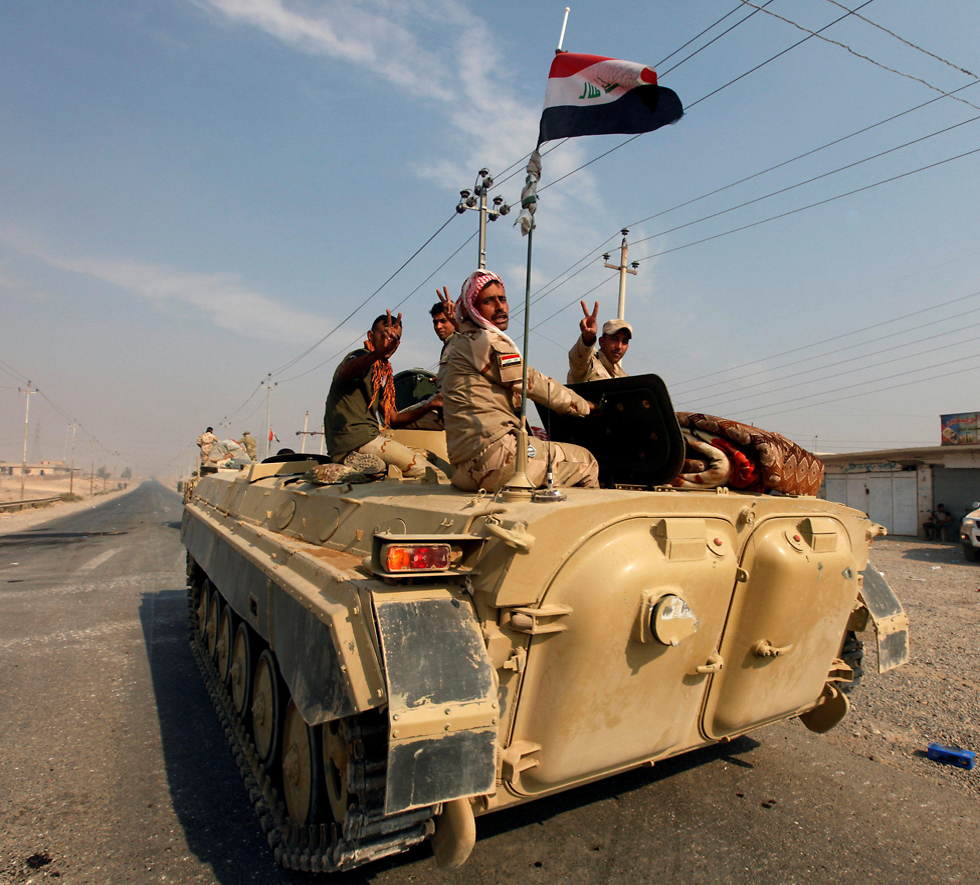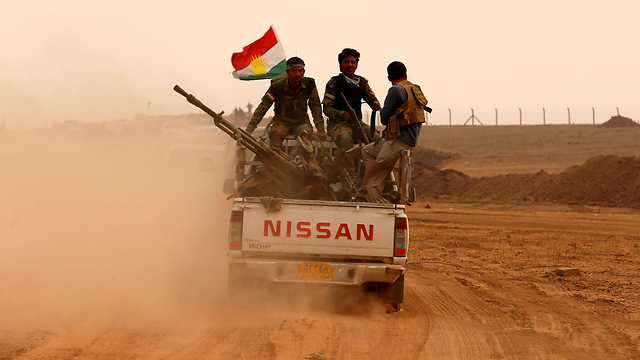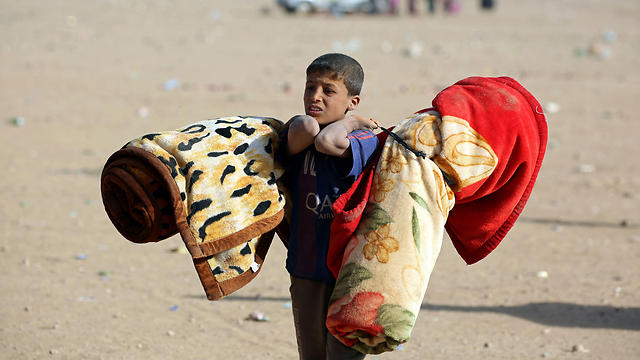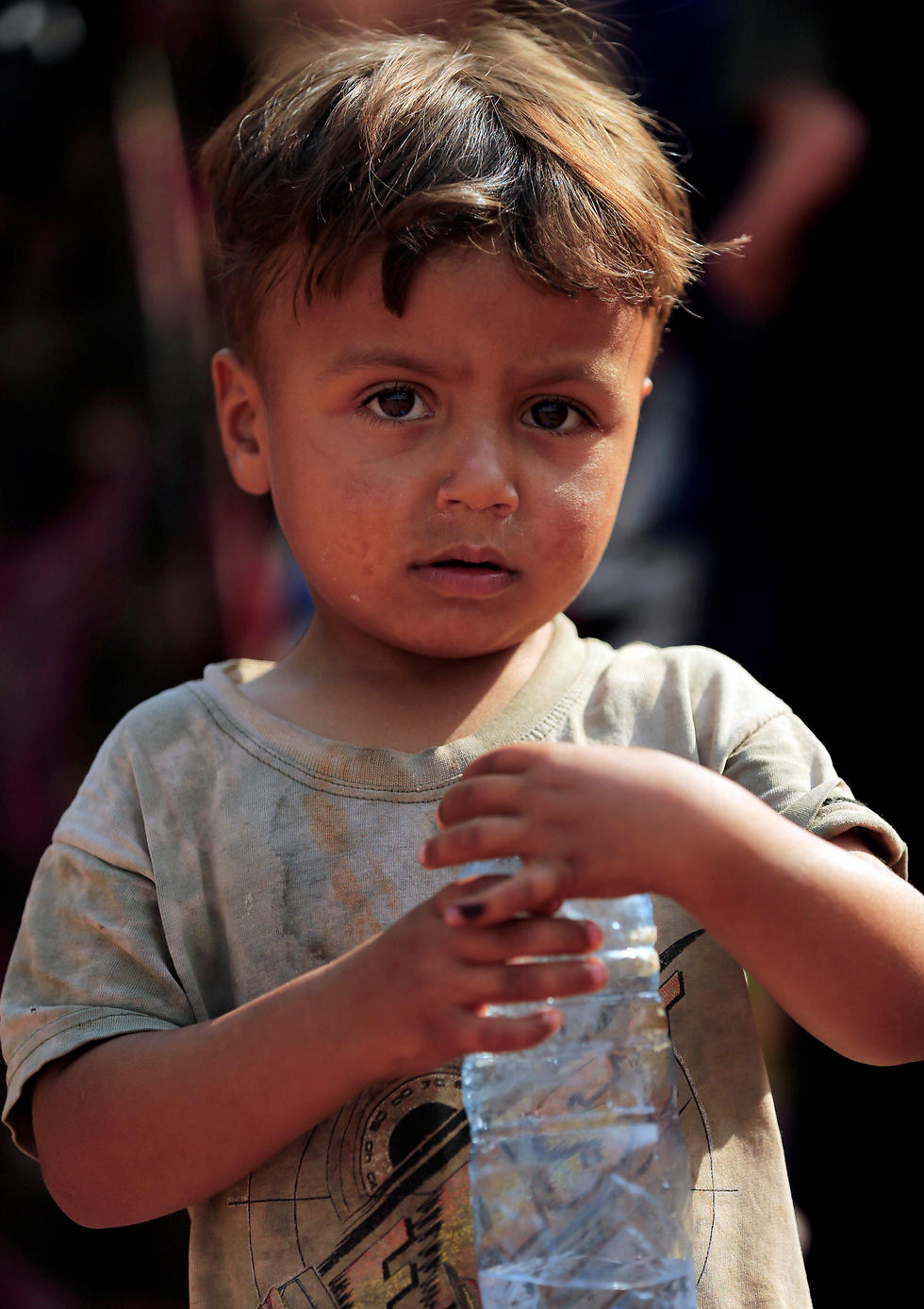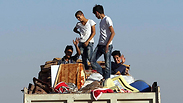
Iraqi special forces have moved more than 1,000 people from villages near the front lines, as they try to recapture Iraq's second biggest city from ISIS jihadists who have controlled it for nearly two and a half years.
In the first 10 days of the Mosul campaign, the Iraqi army and Kurdish peshmerga fighters backed by US-led air forces and troops have made steady gains through often depopulated villages east and south of Mosul.
But as they approach the city itself, still home to more than a million people, the advancing forces are pushing the frontlines into villages like Tub Zawa where residents had until this week stayed put.
That will make the fighting more difficult and deadly, and prompted a senior United Nations official in Iraq to say an exodus from Mosul, and a potential humanitarian crisis, could be only a few days away.
Tub Zawa, close to the main road into Mosul from the east, is one of the first populated villages that was reached by Iraqi counter-terrorism forces after they cleared ISIS last week from a Christian region that has been largely empty since 2014.
Tunnels of terrorism
After releasing the area from ISIS control, the special forces began undertaking cleanup operations in areas retaken from the militants to the east of the city, where troops uncovered a vast tunnel network used by ISIS to shuttle fighters and supplies by motorcycle, Maj. Salam al-Obeidi said.
The militants have had months to prepare for the long-awaited operation and are believed to have developed extensive defenses in and around the city.
"They've really dug in, literally, and started putting up the berms, the trenches, the tunneling systems," said a US military official, speaking on condition of anonymity to discuss the subject with reporters. "And they're quite extensive tunneling systems, some of them stretching upward of two kilometers (over a mile)."
He said Iraqi forces have found homes near Mosul where the lights are wired with explosives that detonate if you flip the switch. Inside Mosul, ISIS has set up large concrete barriers known as T-walls, blocking off several streets.
ISIS is also believed to have grown increasingly brutal as it seeks to eliminate any potential threats from among the local population, killing alleged spies as well as former members of the Iraqi security forces.
US-led forces close in on Mosul
Iraq's elite counter-terrorism forces, which are spearheading the offensive, are now just a few kilometers from Mosul. Beyond Tub Zawa, only Bazwaia village and some military camps separate them from the city's eastern limits.
However, a senior commander said that the troops paused their advance on Tuesday, waiting for the other US-backed forces to close in from the south and northeast.
While the soldiers regrouped, one villager recounted his experiences of life under the Sunni militants now preparing to battle for the city.
Civilians under attack stay hidden for hours
Abdul Bassit, an elderly shepherd from the predominantly Sunni Arab settlement, said he had stayed sheltered for hours with a dozen relatives under the stairs of their house on Monday, while the military bombarded the village was with mortars and air strikes, and the jihadists responded with car bombs.When they fled their homes the next day, they took only their most important possessions with them, which in many cases was livestock.
Women and small children shared space with sheep, goats, calves and chickens in the beds of pickup trucks on their journey to a camp for displaced people at the Kurdish-controlled town of Hassan Sham, further east.
Shaving off the symbols of oppression
So far, the number of people displaced since the Mosul campaign was formally launched on Oct. 17 is relatively modest, with the International Organization for Migration saying just over 10,000 people have been uprooted.
Those who head into Kurdish areas, like the Tub Zawa families, are checked by Kurdish peshmerga on the road linking Mosul to the Kurdish city of Erbil, about 75 km (45 miles) away.
On Tuesday, the villagers parked their cars and pickup trucks along the Erbil highway, as the peshmerga sorted through them. Women and children were bussed quickly to the camp, but men sat in vehicles for hours waiting to undergo security screening.
Some of them took the opportunity to shave their thick beards, which they say ISIS forced them to grow after seizing large swathes of northern and western Iraq in a bid to build a modern-day caliphate. Tufts of dark facial hair littered the road under one of the vehicle's side-view mirrors.
"It was hell," said Abdul Bassit, describing life under the hardline Sunni Islamists. Smoking was forbidden and carried a punishment of 70 lashes, he said. Dress was strictly regulated, cell phones prohibited and women prevented from leaving the house.
The villagers said ISIS fighters did not speak to them much and they avoided contact as much as possible. Most of them were Iraqi, they said, but one man recalled meeting a Kuwaiti fighter.
"We would see them in the mosque for the five daily prayers, but that was about it," he said. The fighters were either killed in Monday's clashes with government forces or fled deeper into ISIS-held territory.
Ahmed Kamel, 31, said the number of ISIS fighters inside Mosul—estimated by the Iraqi military at up to 6,000—was small, but their insurgent tactics would make it difficult for the 30,000-strong Iraqi force to rout them. "It could take one month, one year, 10 days," he said of the offensive. "I don't know."
Tortured locals, finally released
Sixty eight year-old Ghazi Fathi, sitting alone in the driver's seat of a beat up sedan, raised his stained white galabiya to reveal about a dozen crude stitches above his waist and a large bandage on the left side of his abdomen.
"They tortured me," he said of ISIS, without explaining how. "They asked me if I was sheltering my Shi'ite neighbors, and when I told them 'no' they accused me of lying."
The UN High Commissioner for Human Rights said Tuesday that ISIS appears to have carried out a number of atrocities in recent days in and around Mosul, including killing 50 former Iraqi police officers they had been holding in a building near the city. The United Nations and rights groups have similarly expressed fears that ISIS may use civilians as human shields as Iraqi forces converge on the country's second largest city, which is still home to more than a million people.
UN High Commissioner for Human Rights Spokesperson Rupert Colville said ISIS fighters shot dead three women and three girls because they were lagging behind as the militants were forcibly relocating them to another district south of Mosul. He said they were lagging behind because one of the girls had a disability.
"We very much fear that these will not be the last such reports we receive of such barbaric acts," Colville said.
Fathi, writhing in pain on Tuesday, called through his car window for medical aid and water but a peshmerga guard said he had to wait until security clearance was complete. That process did not appear to have started as the sun began to set.
Colville also expressed concern over the "severe measures" taken by local Iraqi Kurdish authorities in Kirkuk following a massive ISIS assault on the northern city last week. He said they had ordered all internally displaced people living outside established refugee camps to vacate their residences and move into the camps, some of which are already full.
"We understand that hundreds of families have now been evicted by Kurdish Security Forces, and are worried that if the evictions continue, it could significantly complicate the already alarming situation of mass displacement in the region," he said.













